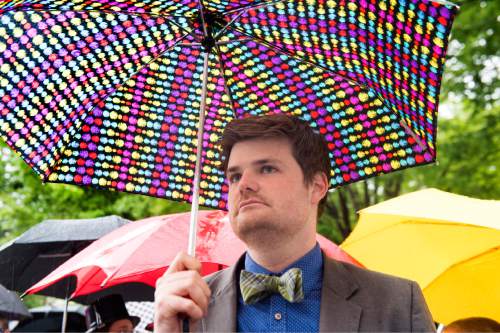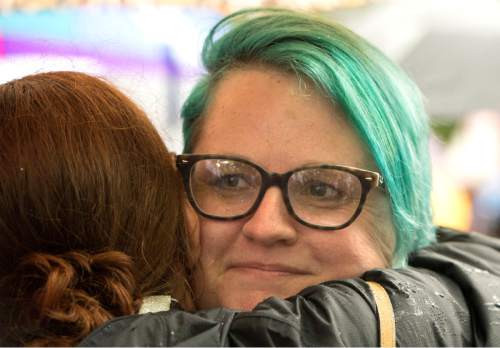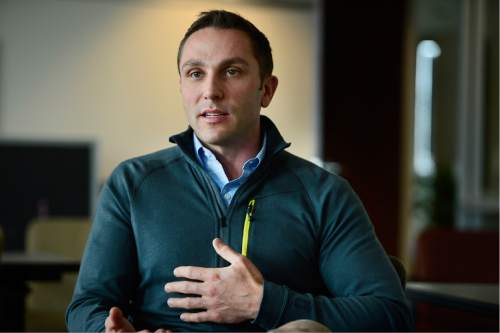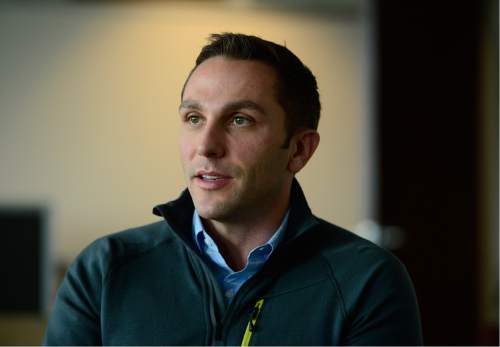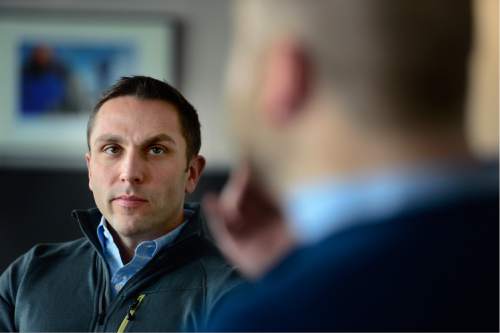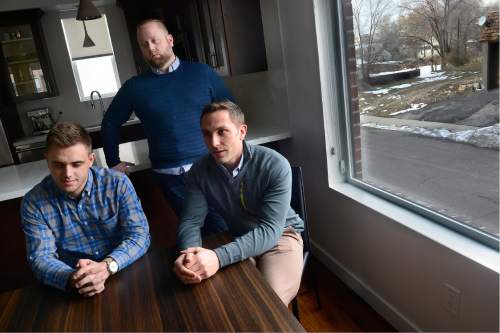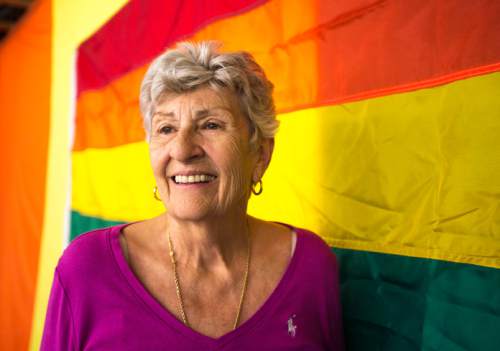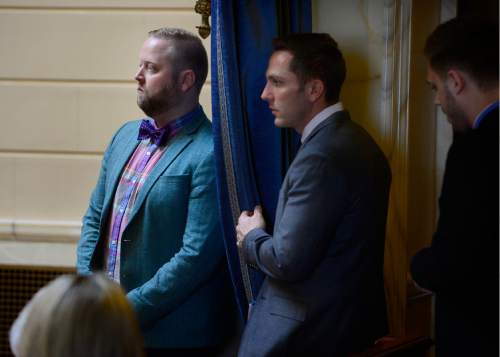This is an archived article that was published on sltrib.com in 2016, and information in the article may be outdated. It is provided only for personal research purposes and may not be reprinted.
In the wee hours of Sunday morning, Club Jam was buzzing just the way it typically does on a weekend, with about 300-plus friends and strangers drinking, dancing and laughing in the safety of a comfortable place.
That's when the customer, a temporary transplant to Utah from Rio de Janeiro, sought the club manager to offer a compliment.
"He said he felt so welcome and at home. He thanked me for making it a place where he felt so loved," said Megan Risbon, who has managed the northern Salt Lake City gay bar for more than two years. "It was about 1:30 in the morning — that's about the same time things were happening in Orlando."
About 2,300 miles away, in a Florida gay bar called Pulse, Omar Mateen was unleashing a hail of bullets, systematically killing 49 and wounding 53 people.
The chilling irony has been gnawing at the 38-year-old Risbon, a longtime straight ally of Utah's lesbian, gay, bisexual and transgender community, ever since.
"It's a lot to process," she said. "The gay clubs and bars have always been a place where the LGBT community can go and feel safe. They know they can go and hold hands with their boyfriend or kiss their girlfriend and not be judged."
That's how it's always been, said Nikki Boyer, a pioneer of Utah's LGBT community who started tending bar at The Sun Tavern in Salt Lake City back in 1974, long before anyone was talking about gay rights or same-sex marriage.
"The bars were the place we felt we could go and be safe," said Boyer, now in her 70s. "We didn't have another place; that was where we lived."
That was before there were pride centers or parades or a national monthlong celebration of the LGBT community wrapped in rainbow colors.
But it's not that Utah's gay clubs never had their share of problems and threats, Boyer said. In the 1970s and '80s, "gay bashers" — including, sometimes, police — were known to threaten and "kick some queer ass." Once, a man came into the Sun with a shotgun, but he never opened fire and was run out and beaten by patrons, she said.
But nothing rose to the level of Sunday's violence, and Boyer admits that she's rattled.
"I hope this will be a rallying cry for the community and bring us together more," she said. "I think our straight allies, even those who have not been particularly visible, will say: This is America, and this is not right."
Mateen's motive for the shooting was unclear Monday.
Investigators say the private security guard, who was killed in a gun battle with police, called 911 just before the attacks and pledged his allegiance to the radical Islamic State group. His father, however, has said publicly that his son was instead upset after recently seeing two gay men kissing in Miami.
Either way, the shooting serves as a strong reminder to the gay community in Utah and everywhere that LGBT people continue to be targets for hatred and violence, despite advances that have leveled the playing field in other corners of society.
"I kind of feel a little scared now," Risbon says.
Scared is not a feeling many in Utah's LGBT community often express. As places go, Salt Lake City seems safer than many other communities across the nation.
Gays often are victims of bias-related crimes, but the state data shows those occur at rates well behind those motivated by factors like race, religion and ethnicity.
And Utah's type of bias and prejudice is nonviolent more often than not, said Chris Wharton, an LGBT attorney from Salt Lake City.
"I wouldn't say that it's because people are less prejudiced," he said. "It's that we're not really in a violent place."
Sunday's shooting in Orlando, however, has set Wharton on his heels and changes the way he's thinking about the club experience. In the past, it was only outside that he practiced vigilance.
Sometimes, he said, he's walked to his car with his keys laced between his fingers in case he needs to thwart a would-be attacker, or pre-dialed 911 and kept his finger hovering over the call button to speed up a rescue — a call he's never had to make.
Like many in the gay community, Wharton said he's not entirely surprised by the Pulse attack. As gay rights have advanced, everyone expected some pushback, he said, but most believe that would take the shape of politics or policy, not violence.
"I think we've lost the presumption that just because marriage equality is legal and our families are legal, that translates into us being safe," he said. "I am guilty of feeling that way. But we're not."
Rusty Andrade shares Wharton's sense of loss.
"It's a reality check that these risks are still there," said Rusty Andrade, a Salt Lake City lawyer who sits on the board of advocacy group Equality Utah.
Andrade knows about those risks firsthand. On Dec. 21, 2014, he and a friend were saying goodnight outside their homes near 300 West and 700 North — across the street from Jam — when they were attacked by two men yelling gay slurs.
Andrade was severely beaten. He suffered injuries to his head, face and mouth and has been diagnosed with brain trauma and post-traumatic stress disorder. The emotional damages he suffered have been so severe that Andrade sold his home and moved away, to a quiet, suburban Salt Lake City cul-de-sac. He said he has to continually work to maintain his sense of safety.
That was harder Sunday, when news of the Orlando shooting struck him.
"It hit my triggers," said Andrade, whose attackers have never been charged with a crime. "For me, the big problems is I feel like we still need protection, but nobody's doing anything about it."
Earlier this year, Andrade lobbied state lawmakers for legislation to put teeth in Utah's hate-crimes law and stiffen the penalties for bias crimes. It did not pass.
On Sunday, Andrade said he found himself wanting to email lawmakers and ask them if the Orlando incident would make them reconsider.
"I wanted to say was, 'Is now the time?' " he said. "Not that a hate crimes law changes anything in this particular situation, but this is what we've been talking about."
Risbon said the attack on Andrade and his friend was an anomaly outside her club, where tempers and lovers' quarrels sometimes flare but rarely escalate into any sort of violence.
She said she'll meet with her staff Tuesday to talk about whether they need to beef up security efforts, including possibly adding metal detectors or purse checks.
"We'll do whatever we need to," she said. "We don't want to lose that safety and that homey feeling that so many of customers come here for."


